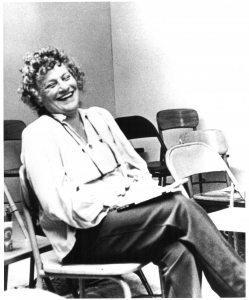-
Approval/Disapproval comes from an authoritarian based system. It starts with our parents, goes to our teachers and we internalize it so completely it becomes the fabric of our lives and of society. I’m not saying that Authoritarians don’t get things done or are not productive. Dictatorships are very efficient. But the constant relationship of authoritarian to subordinates creates a stifling atmosphere where loss of self occurs. Not just to the subservient, but it also isolates the authoritarian as well.
I remember a story Viola liked to tell me about a student of hers who had stubbornly refused to accept Viola’s evaluation style. Viola would laugh, because this girl had done some nice work in class, and yet, after each scene Viola would ask her and the class, “Did you see the where?” “yes.” “Did you stay on focus?” “yes”
“But was I good Viola?” she would interject.
Viola would ignore the question and ask the class “Was it clear who she was and where she was?” The class would answer ‘yes’. “Did she make use of the where, who and what?” “yes.”
“But was I good, Viola?” she insisted.
Viola would laugh and tell me, “No matter what I said about focus, it didn’t matter to her. She kept asking ‘but was I good?’ Well, what was I to do? Lecture her? So, finally I said, Yes, you were good.”
Now Viola had very strict guidelines about using good/bad approval/disapproval words and she never complimented us directly on our scene work. The pleasure at seeing Viola laugh uproariously during the scene or saying “Whooo! I saw that whole thing! That was something!” was validation enough.
It eventually became obvious to me when I did hit the focus because I felt elated and not frustrated, so asking Viola to validate it by pronouncing it good was moot.
Over the years Viola would repeat this story of “Was I good?” to let me know how hooked on praise we can get. Whether from a teacher or boss, many can experience anxiety without hearing words of praise. It can keep us bound to authority and may subvert work not for the sake of itself, but for that gold star or pat on the head.
It always tickled Viola to recall this story, because the student had achieved focus and was able to solve the problem of the game, but her achievement had to come with Viola’s blessing.
Praise is the icing on the cake sometimes and adhering to a principle of strict orthodoxy can sometimes be more trouble than it’s worth. So, I now laugh with Viola when I come across this same issue in students, and mostly my evaluations are enough.
I welcome your comments (and praise, if you must) 🙂

My students are often concerned whether what they are shwing is coming through. They are anxious even when the audience say they showed. What do you tell them to rid of their concern?
Aki,
Evaluation is objective and not subjective. Did the audience see it or are they trying to be ‘nice’ to the player and spare their feelings? If they saw it, say so. If not also just say so – without judgement. This goes against many cultural norms.
You need to have a talk with them about the Approval/Disapproval Syndrome. Anxiety comes from fear: Fear of not doing it right or what they think the teacher expects. That is something that you should look out for and see if you are not encouraging it in some way as well. Viola once told me that “teaching is a cleansing” meaning to me to rid myself of the same things. So I always am careful not to use words like good or bad or use praise and critique. It’s not easy. Have a look at my blog “Sidecoaching and the Language of Authority“.
If they get used to this method, it will beneficial. They will stop seeing in terms of success and failure and focus on how strong the focus.
If one game does not go right and the next team sees what they need to do, you can ask “Did the second team benefit from the evaluation of the first?”
Over time they will get the idea and the fear of failing will diminish.
Gary,
In regular acing class, you get to re-do a piece(monologue or scene) with teacher’s advice and the result is usually better. Maybe
that’s what they expect. They want to feel they learned something right there